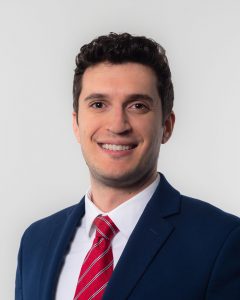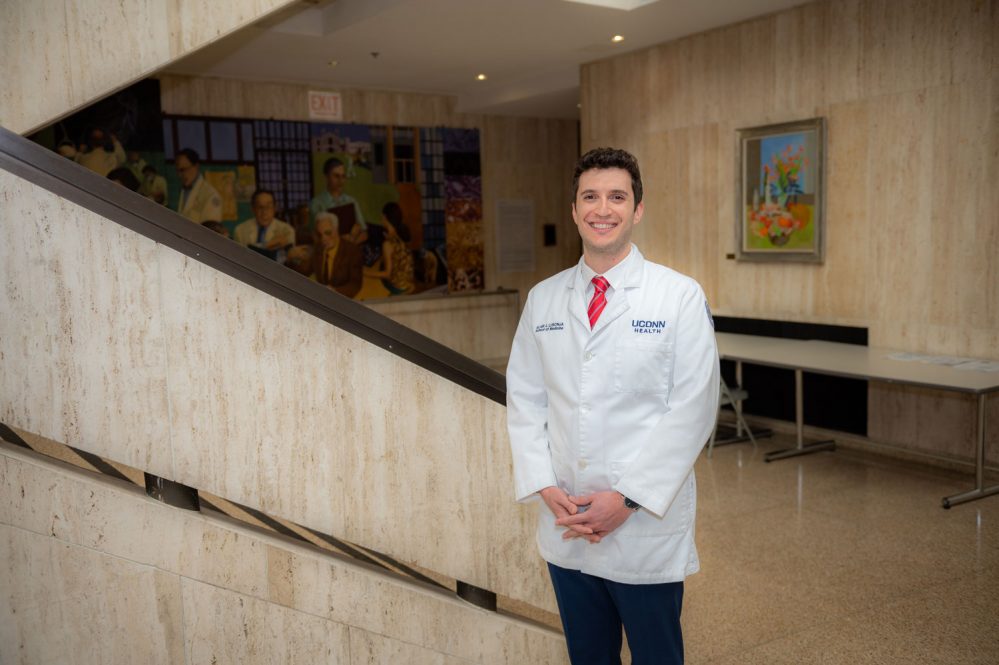After receiving his medical degree this spring, Klair Lubonja is off to New Hampshire, for a general surgery residency at the prestigious Dartmouth-Hitchcock Medical Center. But he’ll bring with him the confidence instilled by a favorite mentor, his experience as a volunteer in community service projects, and the lifelong friendships forged at The Rotunda.

And as far as advice for the School of Medicine students following in his footsteps? Buckle down and focus on academics for the first year, seize every opportunity for leadership, research, and volunteering, and don’t forget: without family, friends, and hobbies, burnout isn’t only possible, it’s likely.
Why did you choose UConn?
I chose UConn School of Medicine because of the strong relationships I had built with the faculty and staff of the school in the years preceding matriculation. The School of Medicine fosters an environment where camaraderie, compassion, and collaboration are valued and encouraged. That was of utmost importance to me. Luckily, my home was close to the school, and so it was a win-win situation financially and academically.
Why did you choose to enter medical or graduate school/the field of medicine or science?
Personal experiences, my characteristics, a love for science and human interaction, and a plethora of educational opportunities in the field of medicine led to my decision to become a physician.
What are your plans after graduation?
Starting in June, I will be a general surgery resident at Dartmouth-Hitchcock Medical Center in Lebanon, New Hampshire. Very excited!
What activities were you involved with as a student?
Throughout my time in medical school, I held several leadership roles, participated in many research opportunities, and dedicated numerous hours to community service. Highlight experiences include the Urban Service Track program, the Stage 2/3 Clerkship Committee, the UConn Immigrant and Refugee Initiative, and the Medical Dental Student Government.
How has UConn prepared you for the next chapter in life?
I believe the School of Medicine has done an excellent job of preparing me for residency training. These last four years gave me the opportunity to strengthen my time management, critical thinking, and professionalism skills.
What is one thing that surprised you about UConn?
The School of Medicine solicits feedback from students at a much higher rate than other institutions. This speaks to the administration’s desire to improve and make the medical school even better for future generations of learners.
Any advice for incoming first-year medical students or other graduate students?
My advice would be for them to focus on their academics during their first year. Those who do well academically should help others who might be having a hard time. Those who are having a hard time should take advantage of all of the support resources available to them. For the three years that follow, students should be proactive and take advantage of as many opportunities as possible that will further their career aspirations. Just like when applying to medical school, academic performance, leadership roles, volunteering, and research, all matter when applying for a residency position. With all of that being said, students should always dedicate time to family, friends, and hobbies. Personal wellbeing is critical to professional performance.
What is one thing students should do during their time at UConn?
I like going on walks and so I would recommend that students go on a walk around the West Hartford Reservoir! Easy walk and great sights.
Who was your favorite mentor and why?
Without hesitation, Dr. Isaac L. Moss. He was my research mentor, clinical mentor, role model, and confidant. I owe much of my success to Dr. Moss and thank him profusely for his unwavering support these last four years. Any student under his tutelage is lucky. Dr. Moss is an inimitable asset to UConn Health and the UConn School of Medicine.
What is one thing that will always make you think of UConn?
The Rotunda! Every time I think about “The Rotunda,” I think of the lifelong friends I have made at the UConn School of Medicine. Great memories.
What was it like training to be a doctor or scientist during a pandemic?
It was very difficult to train during a pandemic. Many didactic and clinical educational opportunities were lost. Furthermore, being in hospitals during the height of the COVID-19 pandemic was challenging physically and emotionally. However, our struggles as students paled in comparison to what attending physicians, nurses, and ancillary staff had to experience. They are true heroes and we students are thankful that they took us under their wing even when hospitals were being overwhelmed by ill patients.



